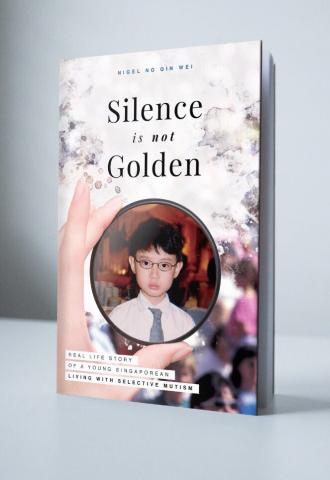
Nigel Ng suffers from a rare condition called Selective Mutism, an anxiety disorder, which makes him a loner amidst a group of people as he is unable to speak or communicate in specific situations when he gets a panic attack. He shares his experiences:
In your book (shown below), you talk about the bullying you underwent in school from classmates and even from teachers. Do those memories still bother you, haunt you? Do you remember how you felt then? What is your reaction now?
Yes, these memories still bother me and give me some unwanted flashbacks, whenever I am alone, when I am not engaging in any activities and just brooding about the past, as my thoughts can wander very quickly and very deeply within a split second. I remember feeling very helpless and the odd one out in school. I felt miserable then, frustrated and even resentful towards society. I am more open minded now, ever since I published my book. I realise I have become happier, more peaceful and in sync with the world at large. I seem to have a better clarity of myself and the world around me now.
Describe the journey from bullying to diagnosis.
I wouldn’t really call it “bullying”. Prior to the diagnosis, I was traumatised by my teachers in primary school. A harsh statement from my Primary 2 teacher was actually the main trigger for me developing SM (Selective Mutism) . The other part of the traumatisation was the Maths teacher in Primary 1 and me facing stress with Maths as a subject. There were other disturbing incidents like my teachers throwing my textbooks around just because I was talking in class.
What did you feel when you were handed a diagnosis of selective mutism? Did the diagnosis help you or did it make acceptance difficult?
I had mixed feelings of the diagnosis, feelings like relief, confusion, even sadness. At that time, I didn’t really know what was going on as I was very young. I wasn’t even aware of the term diagnosis. Part of it helped me because it provided a reason and solution to why “I was behaving like this”, which naturally allowed the treatment to begin. Another part was of course being in denial and finding it difficult to accept the diagnosis. But these were perhaps more true for my family. My family found it difficult to accept the truth. So they often got frustrated with me for not speaking with others when I was outside or in school.
Can you share your coping mechanisms when a panic attack comes on?
I need to go somewhere safe and quiet where I have some alone time and I need the people around me to understand the situation and not make matters worse. I need to go through counselling after the attack. I also need a strong support system when I am facing a crisis like this.
What do you do to prevent a panic attack?
I immediately try to walk away from the situation. The situation at that point of time is a “trigger” and can be an instant trigger if I am around in the vicinity.
I find ways to calm myself by drinking a lot of water, washing my face and going to a quiet place.
You recently spoke in public - how was the experience of preparing for it and actually speaking? How did you manage?
One of my brother’s friends assisted and guided me in this public speaking project. The experience initially was nerve wrecking and stressful, having to record myself speaking on alternate days for about a month and sending the videos to this person for review and progress. The actual day turned out well, better than expected, as I was fully prepared in my content and I received positive vibes of energy from the audience. Most of the audience are people who I am familiar with, as I invited them. Two most important factors in public speaking are authenticity and emotions, so I combined these both and gave the best speech I can ever deliver. Good content is not enough. With those two factors, you can engage the audience well. By engaging with the audience and when your audience can feel the connection, you have passed the test in public speaking. I managed it well and successfully as I believe my story is worth sharing and it is unique as almost no one has even heard of SM. By telling this story, I am also helping others with SM to be understood.
What is the worst thing that some one has said to you?
I have received unpleasant remarks like “retarded and handicapped” when I was in school, multiple times on a constant basis.
What can be done to support and integrate people with anxiety disorders?
I feel that a strong support system is very important. It is important to create support groups so they feel accepted and develop a sense of belonging in a safe community where they can share their stories with no judgement from others.
What is the response to your book? What next for you?
My book sales are getting better now and I have received a lot of positive feedbacks about my book. My books are deposited into the National Library Board for readers to borrow and read, and my books will also be published in major bookstores. I am currently writing my second book, “Beauty of Silence”, a sequel to “Silence Is Not Golden” It will be considered as a closing for the first book, to emphasise on the advantages of being silent and that there is true beauty in silence. I would like to showcase my branding of myself as a person through my book “Silence Is Not Golden” by public speaking, caricature drawing and drumming at functions.
Anything else that you would like to share with our community
I would like the community to be more aware and understanding towards people with SM and provide appropriate support and resources, especially in Singapore, e.g. setting up an organisation/social enterprise/centre, support groups, specially targeted for people with SM as its symptoms are very specific and unique. People with SM need to be heard by the community, specially as the cases are rare as opposed to other common conditions. Their voices are a contribution to the society and community and they have a lot of potential in them once they allow their voices to be heard, once the community gives them the opportunity and acceptance.
Whenever I tell someone about SM, he or she gives me a confused look and then says that they have never heard of it before. Whenever I got these responses, I felt very lost, misunderstood and devastated. Because if someone has never even heard of it, it means that no support will be given to those with SM and they will continue living stressful lives with this condition. People with SM also need a strong support system as any other condition out there.
Nigel Ng is the author of the book "Silence Is Not Golden"







